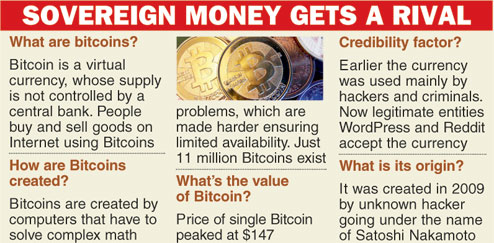 |
London, April 7: Thousands of savers who appear to have lost trust in banks and governments have begun to invest in Bitcoin — a virtual currency created in mysterious circumstances and described by experts as “gold for computer nerds”.
Recently, a buying frenzy has led the value of Bitcoins to rocket. Last week, the price of a single Bitcoin peaked at $147 (£96), sending the value of total Bitcoin stock over $1.5 billion. Although the price had fallen back on Friday, Bitcoins are now worth $100 more than a month ago.
Many people seem happy to trade valuable goods for Bitcoins.
In Canada, a man said he would sell his house for about 5,000 Bitcoins.
A Texan family said on Thursday that they had sold their Porsche for 300 Bitcoins. In Cyprus, one person promised to create a Bitcoin ATM.
Some argue that Bitcoins will revolutionise how we use money. Others claim that it is a hoax. Most puzzled onlookers simply ask: what is Bitcoin?
“Bitcoin is a virtual currency,” said Amir Taaki, a leading developer who set up Britain’s first Bitcoin exchange. “You can trade it over the Internet. It’s not a theoretical concept. It’s here now and it’s working. It’s a billion-dollar economy. The only thing that’s different is that it’s decentralised. There is no central bank. Everybody is their own bank.”
It was created in 2009 by an unknown hacker who goes by the name of Satoshi Nakamoto. Bitcoins are created by computers that have to solve mathematical problems. These problems are made harder over time, ensuring that there is a limited supply of Bitcoins created. About 11 million exist, with an eventual limit fixed at 21 million.
Until recently, Bitcoins were associated mainly with hackers and criminals. But legitimate businesses, including websites such as WordPress and Reddit, have also begun to accept payments.
Taaki warns against treating the Bitcoin as a clever modern investment. “I don’t think the price is reliable,” he said. “I wouldn’t tell people to put their life savings into it. For me, Bitcoin is not about making money. I think it’s an interesting social tool. But I’m not in it to get a flashy car or a nicer house. This is about freedom of financial speech.”










